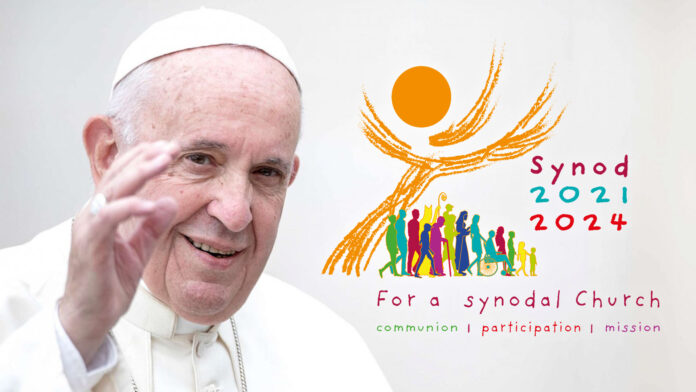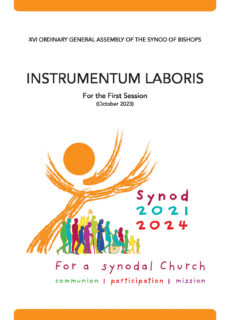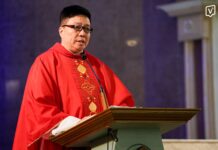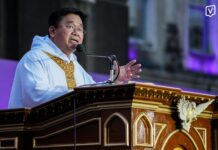
Aiming to become a “listening church,” Pope Francis’s “Synod on Synodality” will gather more than 400 delegates for three weeks to discuss hot-button issues hounding the Church, including admitting female clergy, accepting gay and lesbian Catholics, and ordaining married men.
The agenda of the synod’s first session, which will commence on Oct. 4 and end on Oct. 29, is the product of multiyear listening sessions in dioceses around the world that began in 2021.
The second session is scheduled for October 2024, when the pontiff will issue a document either endorsing or rejecting recommendations of the synod delegates.
About 20 percent of the delegates are non-bishops, which include theologians and laypeople, who were personally selected by Francis. More than 50 women will be eligible to vote.
Kaloocan Bishop Pablo Virgilio David, president of the Catholic Bishops’ Conference of the Philippines (CBCP), will lead the Filipino delegation. He will be accompanied by Pasig Bishop and CBCP Vice President Mylo Hubert Vergara, Manila Archbishop Jose Cardinal Advincula and Filipino theologian Estela Padilla.

The Vatican published in June a 50-page working document called “Instrumentum Laboris,” containing 15 worksheets to guide delegates on the issues and rooted in three central themes: communion, mission and participation.
“The Synodal Assembly of October 2023 will be asked to listen deeply to the situations in which the Church lives and carries out its mission,” the document stated. “What is at stake is the ability to proclaim the Gospel by walking together with the men and women of our time, wherever they are, and practicing the catholicity that emerges from walking together with the Churches that live in conditions of particular suffering.”
Women in the diaconate
As the Church is confronted by calls to open more leadership opportunities for women, delegates could tackle the proposal of admitting females in the diaconate.
“Women play a major role in transmitting the faith in families, parishes, consecrated life, associations and movements and lay institutions, and as teachers and catechists. How can we better recognize, support, and accompany their already considerable contribution? How can we enhance it in order to learn to be an increasingly synodal Church?” the document asked.
Miriam Duignan, a member of the Austrian group Women’s Ordination Nationwide, has called on the Church to allow female ordination to alleviate the lack of priests in communities. Welcoming female deacons, she said, would be a significant factor in admitting women to the priesthood later on.
“In almost every parish in the world where synod discussions took place, from Lesotho to the Philippines to Peru, women were talked about as an area where change is needed,” she said in an interview with British newspaper The Guardian.
“The Catholic Church doesn’t have enough priests, and yet everyone knows nuns and laywomen who are already doing 90 percent of the work in the parishes – then they have to stand aside when a priest is needed to say Mass,” she added.
The Holy See highlighted the number of women working in Vatican commissions and Roman Curia offices, marking a 37-percent increase in a decade since Francis was elected to the papacy in 2013.
Outreach to LGBT community
The synod will also discuss the need to take concrete steps to embrace lesbian, gay, bisexual, transgender, queer or questioning persons (LGBTQ+) as the community, according to the listening sessions, feel “hurt” and “unwelcomed” by the Church.
“In the light of the Post-Synodal Apostolic Exhortation Amoris Laetitia, what concrete steps are needed to welcome those who feel excluded from the Church because of their status or sexuality?” the document asked.
Francis has already appointed Fr. James Martin, S.J., an American priest actively advocating for greater inclusion of LGBTQ+ Catholics, as one of the synod participants.
The Pope previously stressed in an interview with the Associated Press (AP) that “being homosexual isn’t a crime.” Over 60 countries impose jail time on same-sex couples having consensual sex.
“We are all children of God, and God loves us as we are and for the strength that each of us fights for our dignity,” he told the AP.
Married men in the priesthood
Another nagging issue is the ordination of married men.
“As some continents propose, could a reflection be opened concerning the discipline on access to the Priesthood for married men, at least in some areas?” the working document asked.
The Holy See allows married men to enter the priesthood in Eastern Rite Churches. It also permits married Anglicans to remain priests if they convert to Catholicism.
Pope Francis, in 2020, rejected pleas from Latin American bishops to ordain married men amid the lack of priests.
Affirming the millennium-old tradition of priestly celibacy, he wrote in his reflective document “Beyond Amazon” that “the exclusive character received in Holy Orders qualifies the priest alone to preside at the Eucharist.”
The pontiff urged bishops instead to be “more generous” to individuals displaying “missionary vocation” to choose to serve in the Amazon.
The possibility of ordaining viri probati, or married men of “proven virtue and statute in their communities,” was rejected by Pope Paul VI in 1971, contending that celibacy is an indispensable condition for priesthood necessary for the edification of the Church.
Pope John Paul II in 1990 described the proposal as “part of a systematic propaganda” by the media and Pope Benedict XVI said in 2005 that viri probati is “a road not to follow.”
Seeking justice for sexual abuse survivors
The Instrumentum Laboris also touched on the pressing and alarming issue of sexual abuse that has gripped Churches all over the world.
The document acknowledged that the institution is suffering a “serious crisis of mistrust and lack of credibility” over revelations of abuse and cover-ups that unleashed a series of reckonings in countries like the United States, Britain, Germany, France and Portugal.
“In many contexts, crises related to sexual abuse, and abuse of power, money and conscience have pushed the Church to a demanding examination of conscience so that ‘moved by the Holy Spirit,’ the Church ‘may never cease to renew herself’ in a journey of repentance and conversion that opens paths of reconciliation, healing and justice,” it stated.
The Pontifical Commission for the Protection of Minors, an advisory body established by Pope Francis in 2014, said the synod must conduct substantial discussions to address clergy sex abuse.
“We ask that sexual abuse in the Church permeate your discussions as they address teaching, ministry, formation and governance,” it said on Sept. 27.
“We urge you to work toward the day when all ministries in the Church become places of welcome, empathy and reconciliation for those impacted by abuse,” it added.
Reaching far-flung areas
Synodal consultations spearheaded by the CBCP found poverty as a “major obstacle” for Filipino Catholics in practicing their faith.
In a 31-page synodal report published in August 2022, Bishop David said Masses celebrated only once a year in far-flung areas underscored longstanding issues in the Philippine Church in terms of coordination and intervention.
“The poor, in many places, still feel that they are not welcomed, nor do they feel they belong, or are even wanted,” the report, titled “Salubong (Welcoming Encounter): The Philippine Catholic Church Synodal Report,” stated. “It shows that the Church has no sustained intervention to make the poor self-reliant and interdependent.”
“We realize that the Church is still malayo (far) from the faithful, especially to those in the ‘existential peripheries’ because of our absence or lack of presence in their daily life concerns. Malabo (unclear) because of our inconsistencies and lack of witnessing. And nakakalito (confusing) because of our disorganized and uncoordinated efforts in mission,” it added.
The report also highlighted perceptions that the Church alienates the poor because of limited engagements with them.
“The Church has to address the common perception that it is the Church of the rich, the influential and the powerful, as well as the perception of the young that the Church has become outdated or irrelevant,” it said. A.M. Maestrado and S.M.S. Balagan













